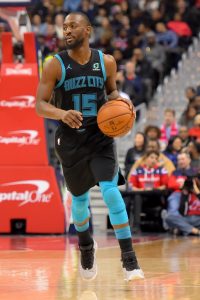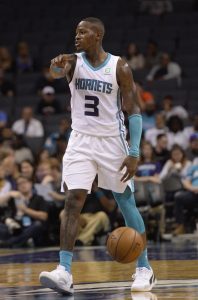The Hornets entered the 2019 offseason in a no-win situation, forced to decide between two unfavorable paths.
On the other hand, letting Walker go would mean losing the only All-Star on the roster and not getting anything back for him or gaining the cap flexibility necessary to replace him in any meaningful way. The team’s cap would still be overloaded with lucrative contracts for unspectacular veterans with no real way to get out from under those contracts for another year or two.
Once it became clear that Walker wasn’t interested in sticking around for the terms the Hornets were offering (reportedly about $160MM for five years), president of basketball operations Mitch Kupchak attempted to thread the needle between those two unfavorable outcomes by working out a sign-and-trade with the Celtics to get something back for his All-NBA point guard. The result was a three-year, $56MM+ investment in Terry Rozier, who has started 30 career games and has never made more than 39.5% of his field goal attempts in a single season.
No matter how the Hornets’ commitment to Rozier plays out, it’s clear that the franchise is entering a new era, one that might get worse before it gets better. Walker’s departure this summer signaled that a full-scale rebuild is on the way.
Key offseason losses:
 Having spent the first eight years of his NBA career in Charlotte, Walker leaves the Hornets as the organization’s all-time leader in points, three-pointers, minutes played, and a handful of other categories. He played his best ball in recent years, earning All-Star nods in each of the last three seasons and making his first All-NBA team in 2019.
Having spent the first eight years of his NBA career in Charlotte, Walker leaves the Hornets as the organization’s all-time leader in points, three-pointers, minutes played, and a handful of other categories. He played his best ball in recent years, earning All-Star nods in each of the last three seasons and making his first All-NBA team in 2019.
That All-NBA nod may actually have helped cement his departure from Charlotte, as it made him eligible for an extra $31MM+ over the course of a five-year, maximum-salary contract. The Hornets weren’t willing to go nearly that high, with Kupchak suggesting in an interview this offseason that the team was “blindsided” by Walker qualifying for the super-max based on the preparations they’d made heading into the season.
Would the Hornets and Walker have been any more likely to work something out if he hadn’t qualified for the super-max? Maybe not. But it’s still a question that might linger for the next few years, especially if Kemba thrives in Boston and the Hornets’ rebuild comes along slowly.
While the loss of Walker was the story of the summer in Charlotte, Jeremy Lamb‘s departure shouldn’t be understated. He was the club’s second-best player for much of last season, averaging a career-high 15.3 PPG and 5.5 RPG and becoming a fixture in the starting lineup for the first time in his career. He’ll be missed on the wing.
Tony Parker‘s and Frank Kaminsky‘s exits from Charlotte are also worth noting. Parker provided veteran stability behind Walker at the point last season, though of course he was no longer the same player he was in his prime with the Spurs. Years from now, his one year in Charlotte might be remembered like Hakeem Olajuwon‘s time with Toronto or Patrick Ewing‘s stops in Seattle and Orlando.
Kaminsky had a longer stay with the Hornets, but his on-court contributions were modest relative to the expectations he faced entering the NBA as the ninth overall pick in 2015. Hornets fans may be left wondering what the roster would look like today if the team had accepted the Celtics’ offer of four first-rounders for that No. 9 pick in ’15 instead of using it to draft Kaminsky.
Key offseason additions:
As noted above, the best stretch of Rozier’s career came during the 2018 postseason, when the Celtics came within one game of the NBA Finals without star point guard Kyrie Irving. In that 19-game playoff run, Rozier averaged 16.5 PPG, 5.7 APG, and 5.3 RPG while starting every game and playing a team-high 36.6 minutes per contest. He even made 40.6% of his field goal attempts, topping his career-high regular season mark.
In Charlotte, without any legit competition for the starting point guard job, Rozier will get the chance to show that performance was for real. I’m not convinced he can be an above-average NBA starter, but the Hornets are pot-committed to their bet on the former Celtic and will give him every opportunity to succeed.
Besides Rozier, the Hornets’ most notable incoming players are rookies, led by lottery pick PJ Washington. The versatile forward out of Kentucky may not become a star, but like 2018 first-rounder Miles Bridges, he has a high floor and could be ready for a regular role sooner rather than later. He has the skill set necessary to make an impact on both ends of the court.
Cody Martin, the 36th overall pick in this year’s draft, will also battle for minutes in Charlotte this year, but it doesn’t seem as if No. 52 selection Jalen McDaniels is a big part of the club’s long-term plans. He was the last unsigned pick from this year’s draft – with the exception of players who agreed to spend the season overseas or in the G League – and isn’t a lock to make the regular season roster.
Outlook for 2019/20:
Even with an All-NBA point guard in their backcourt, the Hornets weren’t a playoff team. Now that they’ve lost that All-NBA point guard without making many other changes to the roster, it’s not a real surprise that oddsmakers are projecting them to have the league’s worst record in 2019/20.
That’s not to say the Hornets can’t exceed expectations. Maybe getting out of Boston and having a starting job will buoy Rozier to a career year. Maybe young players like Washington, Bridges, and Malik Monk prove they’re capable of being immediate contributors and long-term building blocks. Maybe some of the Hornets’ veterans on expiring contracts play well and allow the club to flip them for positive value at the deadline.
Still, it’s hard to envision a path to playoff contention for this Charlotte squad. This roster will likely have to be torn down further before it can be built back up.
Salary information from Basketball Insiders was used in the creation of this post. Photos courtesy of USA Today Sports Images.

 Having spent the first eight years of his NBA career in Charlotte, Walker leaves the Hornets as the organization’s all-time leader in points, three-pointers, minutes played, and a handful of other categories. He played his best ball in recent years, earning All-Star nods in each of the last three seasons and making his first All-NBA team in 2019.
Having spent the first eight years of his NBA career in Charlotte, Walker leaves the Hornets as the organization’s all-time leader in points, three-pointers, minutes played, and a handful of other categories. He played his best ball in recent years, earning All-Star nods in each of the last three seasons and making his first All-NBA team in 2019.